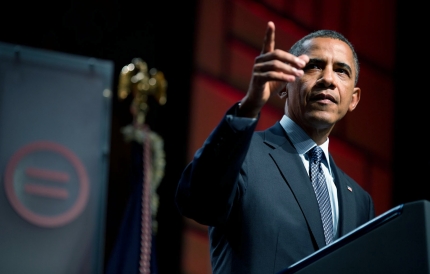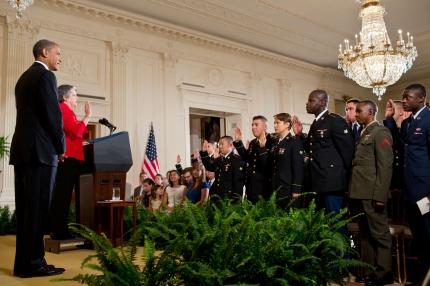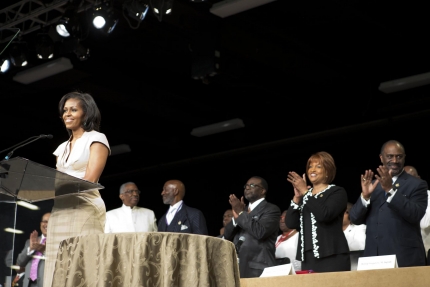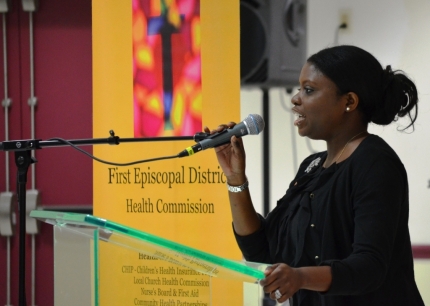Blog Posts Related to the African American Community
President Obama Speaks to the National Urban League
Posted by on July 26, 2012 at 10:23 AM ESTLast night, President Obama addressed the National Urban League, and discussed his Administration's work to help strengthen our nation’s communities and support a strong and growing middle class.
Helping build strong communities has been a part of the Urban League’s mission since its founding, the President said:
For nearly a century, the National Urban League has been inspiring people of every race and every religion and every walk of life to reach for the dream that lies at the heart of our founding -- the promise that no matter who you are, no matter what you look like, no matter where you came from, no matter how modest your beginnings, no matter what the circumstances of your birth, here in America, you can make it if you try.
The President explained that although this dream has never come easy, it’s this very promise that drew him to his work rebuilding neighborhoods on the South Side of Chicago, and later, into politics.
That idea that everybody should have a fair shot, not just some -- that this country is special because it has grown this magnificent middle class and has provided ladders of access for those striving to get into the middle class -- that's the idea that drove me. That's the idea that has driven the Urban League. That idea that everyone should have equal opportunity -- that's what brought me to Chicago. That belief that this country works best when we are growing a strong middle class and prosperity is broad-based -- that's what led me into politics.
Learn more about Economy, Urban PolicyAfrican American Women's Forum
Posted by on July 24, 2012 at 3:35 PM ESTToday, the White House hosted an African American Women’s Forum, bringing women from across the nation together for an opportunity to discuss issues that are important to women in the African American community. First Lady Michelle Obama surprised guests to provide some of her thoughts on the theme, “Mother, Sister, Daughter, Leader,” an idea she fully embodies.
Many topics were discussed including education and college affordability. One of the panels at the forum focused on the Affordable Care Act and how it will affect African American women. The Surgeon General, Dr. Regina Benjamin, discussed the importance of prevention for women and emphasized this point by leading the group in an exercise activity! Jocelyn Frye, Deputy Assistant to the President and Director of Policy and Projects for the First Lady, provided insight on current and future projects Mrs. Obama is working on, and Deputy Adminstrator Marie Johns led a panel on the economy and education. Gene Sperling, Assistant to the President and Director of the National Economic Council, analyzed the current economic status of African American Women in the United States and shared his plan to enact more meaningful fiscal change in the community as a whole.
Heather Foster is an Associate Director for the Office of Public Engagement.
Learn more about WomenTen Ways Immigrants Help Build and Strengthen Our Economy
Posted by on July 12, 2012 at 9:09 AM ESTAmerica is a nation of immigrants. Our American journey and our success would simply not be possible without the generations of immigrants who have come to our shores from every corner of the globe. It is helpful to take a moment to reflect on the important contributions by the generations of immigrants who have helped us build our economy, and made America the economic engine of the world.
How do immigrants strengthen the U.S. economy? Below is our top 10 list for ways immigrants help to grow the American economy.
- Immigrants start businesses. According to the Small Business Administration, immigrants are 30 percent more likely to start a business in the United States than non-immigrants, and 18 percent of all small business owners in the United States are immigrants.
- Immigrant-owned businesses create jobs for American workers. According to the Fiscal Policy Institute, small businesses owned by immigrants employed an estimated 4.7 million people in 2007, and according to the latest estimates, these small businesses generated more than $776 billion annually.
- Immigrants are also more likely to create their own jobs. According the U.S. Department of Labor, 7.5 percent of the foreign born are self-employed compared to 6.6 percent among the native-born.
- Immigrants develop cutting-edge technologies and companies. According to the National Venture Capital Association, immigrants have started 25 percent of public U.S. companies that were backed by venture capital investors. This list includes Google, eBay, Yahoo!, Sun Microsystems, and Intel.
- Immigrants are our engineers, scientists, and innovators. According to the Census Bureau, despite making up only 16 percent of the resident population holding a bachelor’s degree or higher, immigrants represent 33 percent of engineers, 27 percent of mathematicians, statisticians, and computer scientist, and 24 percent of physical scientists. Additionally, according to the Partnership for a New American Economy, in 2011, foreign-born inventors were credited with contributing to more than 75 percent of patents issued to the top 10 patent-producing universities.
- Immigration boosts earnings for American workers. Increased immigration to the United States has increased the earnings of Americans with more than a high school degree. Between 1990 and 2004, increased immigration was correlated with increasing earnings of Americans by 0.7 percent and is expected to contribute to an increase of 1.8 percent over the long-term, according to a study by the University of California at Davis.
- Immigrants boost demand for local consumer goods. The Immigration Policy Center estimates that the purchasing power of Latinos and Asians, many of whom are immigrants, alone will reach $1.5 trillion and $775 billion, respectively, by 2015.
- Immigration reform legislation like the DREAM Act reduces the deficit. According to the nonpartisan Congressional Budget Office, under the 2010 House-passed version of the DREAM Act, the federal deficit would be reduced by $2.2 billion over ten years because of increased tax revenues.
- Comprehensive immigration reform would create jobs. Comprehensive immigration reform could support and create up to 900,000 new jobs within three years of reform from the increase in consumer spending, according to the Center for American Progress.
- Comprehensive immigration reform would increase America’s GDP.The nonpartisan Congressional Budget Office found that even under low investment assumptions, comprehensive immigration reform would increase GDP by between 0.8 percent and 1.3 percent from 2012 to 2016.
Learn more about ImmigrationPresident Obama Salutes New American Citizens
Posted by on July 4, 2012 at 12:39 PM ESTPresident Obama began his Independence Day celebrations by hosting a naturalization ceremony for active duty service members in the East Room of the White House. It was the third time the President has hosted this kind of service, and he told the audience, which included the families of the service members who were taking the oath of citizenship, that it is one of his favorite things to do. "It brings me great joy and inspiration because it reminds us that we are a country that is bound together not simply by ethnicity or bloodlines, but by fidelity to a set of ideas."
Before the President gave his remarks, U.S. Citizenship and Immigration Services Director Alejandro Mayorkas presented the countries of the candidates for naturalization and Secretary of Homeland Security Janet Napolitano delivered the oath of allegiance. President Obama told the new citizens that is was an honor to serve as their Commander in Chief, and to be the first to greet them as "my fellow Americans."
Learn more about Immigration, VeteransFirst Lady Michelle Obama at the African Methodist Episcopal Church's General Conference
Posted by on June 30, 2012 at 9:34 AM ESTWhat a pleasure it was to travel to Nashville, Tennessee with the First Lady as she addressed the 49th Quadrennial Session of the African Methodist Episcopal (AME) Church's General Conference. The AME Church is the nation's oldest African American denomination. Tracing its roots back to the time of slavery in the late 1700s, the minister who started the first AME church did so after his former church demanded African Americans worship in a segregated balcony. Since then the denomination – fueled by the strength, determination, and unflinching faith that sustained that early church – has been an engine for change in communities throughout American history. AME churches have been stops on the Underground Railroad, hosts of civil rights marches, and even, founders of universities.
The First Lady drew upon this rich history in her remarks to encourage all Americans to get involved in the lives of our families, our neighborhoods, and our country. The lessons and the legacy of the AME Church are part of our story as Americans, and as citizens, we have inherited the responsibility to be active and engaged in our democracy. She also spoke about the quiet heroes whose names we might not know – individuals working behind the scenes, day after day without recognition, helping to make our communities stronger. "Time and again," Mrs. Obama said. "History has shown us that there is nothing more powerful than ordinary citizens coming together for a just cause."
Seeing and hearing the spirited enthusiasm of the crowd, estimated at 10,000, was uplifting and energizing. But one particularly special moment took place after the First Lady’s speech when she returned backstage. There, she greeted Dr. Jayme Coleman Williams, a woman she mentioned in her remarks that has worked tirelessly in the AME Church for decades. Ninety-three years young, Dr. Williams was a bundle of energy and spoke passionately about encouraging young people to stay engaged and keep building on the work that others have started to move our nation forward. Watching the two hug and chat – one, a quiet hero and the other, the First Lady of the United States – was a poignant reminder of the extraordinary change that can happen when people get involved and make their voices heard.
Confronting High Blood Pressure Through Public-Private Partnerships
Posted by on June 21, 2012 at 5:15 PM ESTHeart disease and stroke are the first and fourth leading causes of death in the United States, respecitvely. Responsible for 1 of every 3 deaths in the country, heart disease is an even greater risk in the African American community. Although African American adults are 40% more likely to have high blood pressure, they are 10% less likely than their non-Hispanic white counterparts to have their blood pressure under control.
To help reduce this health disparity, Manage BP with AMEChealth.org is the African American Episcopal Church (AMEC) Health Commission’s groundbreaking hypertension prevention initiative. Designed to leverage technology to reduce hypertension rates and to improve health outcomes, the program utilizes the church’s web-based platform—www.amechealth.org—to deliver health education messages, disseminate health information, collect patient-generated data, and provide peer support.
The Manage BP with AMEChealth.org campaign will initially involve 10 AME churches in the New York City metropolitan area and will reach more than 20,000 congregants. The launch is just the beginning of a larger program, which will expand to include 4,000 AME churches across the nation.
Learn more about Health Care
- &lsaquo previous
- …
- 13
- 14
- 15
- 16
- 17
- 18
- 19
- 20
- 21
- …
- next &rsaquo



